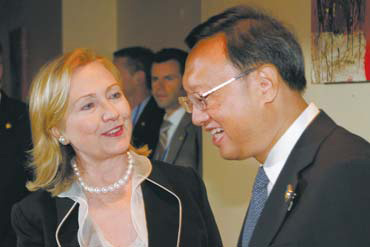China and ASEAN can solve disputes
Updated: 2011-07-23 08:00
By Cheng Guangjin and Wang Chenyan (China Daily)
|
|||||||||||
|
Foreign Minister Yang Jiechi speaks with US Secretary of State Hillary Clinton before a meeting on the Indonesian island of Bali on Friday. Murdani Usman / Reuters |
Foreign minister says country is committed to freedom of navigation
BEIJING - China and the Association of Southeast Asian Nations (ASEAN) have the ability and wisdom to settle the South China Sea disputes, Foreign Minister Yang Jiechi told US Secretary of State Hillary Clinton on Friday.
Yang, speaking on the sidelines of the ASEAN Regional Forum to be held on Saturday on the Indonesian island of Bali, said the Chinese side is committed to maintaining freedom of navigation and security in the area.
Clinton said the United States understands that the South China Sea issue is complex and the US side takes no position on the issue.
She added that Washington supports measures conducive to the settlement of the disputes, and has no intention of getting involved or making it a problem in China-US relations.
But Clinton was set to make a speech on Saturday to her Asian counterparts in which she would emphasize that the US had a "strategic stake" in the South China Sea.
A US official traveling with Clinton said she would make a "very detailed statement" at the ASEAN forum about the importance of the South China Sea to US and global commerce.
China and ASEAN countries recently reached agreement on the guidelines of implementing the Declaration on the Conduct of Parties in the South China Sea, which lays a foundation for cooperation in the area and demonstrates that China and ASEAN countries can solve the disputes on their own, Yang said.
Yang and his ASEAN counterparts approved the guidelines on Thursday.
The US recently conducted joint naval drills with the Philippines and Vietnam in the South China Sea, which China called "inappropriate".
The Philippines, Malaysia, Brunei and Vietnam - all ASEAN members - have competing claims of sovereignty over some islands in the South China Sea, which have historically been Chinese territory.
Washington also irritated Beijing by declaring it has a national interest at stake in ensuring freedom of navigation and trade.
"The White House would never like to see China's dominance in the area, but it will not allow either the Philippines or Vietnam to misunderstand its intentions and get involved in any military actions," Niu Xinchun, a scholar on US studies at the China Institutes of Contemporary International Relations, told China Daily.
"So the declaration of conduct is in the interests of both China and the US," Niu said.
Washington's support of some countries does not mean the US supports them provoking China or even starting a war with China, but is aimed at the balance of power in the region, said Niu.
"Since last year, Washington's high-profile engagement has actually affected Sino-US relations. But it is not in the interest of both countries to lock bilateral ties in a standstill. So we can see the Americans now have cooler heads to deal with the South China Sea issue," Yuan Peng, Niu's colleague, told China Daily.
In their talks, Yang also focused on Sino-US cooperation on a range of issues including efforts to bring the Democratic People's Republic of Korea (DPRK) back into the Six-Party Talks on its nuclear program.
The disarmament talks have been stalled since 2008, when the DPRK walked out to protest international criticism of a prohibited long-range rocket launch.
They also reached consensus on cooperation in such areas as food security, urban search and rescue, and disaster relief.
Clinton reiterated that the United States adheres to a one-China policy and respects China's sovereignty and territorial integrity.
Clinton will fly on Sunday from Bali to Hong Kong and stop by the southern Chinese city of Shenzhen on Monday for a meeting with State Councilor Dai Bingguo.
She is due to give a speech in Hong Kong on Monday that will emphasize the US view of economic ties with China.
Xinhua, AFP, AP and Reuters contributed to this story.
China Daily
(China Daily 07/23/2011 page1)
